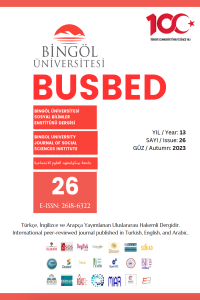LİBERALİZM MERKEZLİ ÇOKKÜLTÜRLÜLÜK KAVRAMINA ELEŞTİREL BİR BAKIŞ: BHİKHU PAREKH ÖRNEĞİ
A CRITICAL APPROACH TO THE CONCEPT OF LIBERALISM CENTERED MULTICULTURALITY: THE CASE OF BHIKHU PAREKH
Author(s): Veysel ErgüçSubject(s): Sociology of Culture, Sociology of Politics
Published by: Bingöl Üniversitesi Sosyal Bilimler Enstitüsü
Keywords: Multiculturality; liberalism; universality; culturally based federal structure; Bhikhu Parekh;
Summary/Abstract: The concept of multiculturalism, which emerged in relation to the management of cultural diversity and different identities within nation-states within the political community, has been a frequently discussed topic in many fields of study in social sciences since the 1970s. Within the scope of this concept, the principle of recognition and coexistence of features pointing to different cultures by public institutions is included. Some thinkers who developed a critical perspective on multiculturalism, which was invented to promote the diversity of indigenous peoples in Australia and Canada, stated that the concept was loaded with an ideological baggage centered on liberalism. The thinkers who stated that the universality expressed in the context of liberalism essentially refers to the special, express that the special is Europe. In addition, they claim that multiculturalism at the center of liberal ideology points to the hierarchical superiority of Europe, and that the universal corresponds exactly to this. The thought of Bhikhu Parekh, who appears as a prominent name among the mentioned thinkers, will be examined within the scope of this study. Within the scope of the study, three questions will be followed. First, the question will be asked with which concept set the thinker associates multiculturalism. In response to the aforementioned question, it will be said that Parekh approaches multiculturalism within the framework of the interaction of culture and nature. The second question will be what kind of meaning Parekh attributes to liberalism. It will be said that Parekh connects classical liberalism with colonialism. The third question will be what kind of solution Parekh, who wants to free multiculturalism from such liberalism, proposes. The philosopher's statement about producing an interpretation of liberalism that is compatible with different cultures will be the answer to the third question. Parekh declares that liberalism is confined to a narrow understanding. Expressing that the view of human nature in liberalism is attached to the abstract mind, Parekh states that an identity that includes universality in the center of sameness derives from this. In such a situation, Parekh, complaining that culture is being ignored, attempts to redefine human nature, which he thinks is stuck in the abstract, with difference-centered culture and to construct a new identity based on difference. Parekh, who defines his effort as the transformation of the abstract and single universal into a pluralistic universal, states that this will be possible with the reconstruction of liberalism. Essential to the redefinition of liberalism, according to Parekh, is the reconstruction of identity by redefining the link between land, sovereignty and culture. It is essential for Parekh to construct such a national identity in a way that includes all cultures. Starting from this point, the thinker aims to reconcile liberalism with the culture that has differences at its center, to bring together the universal with the particular, to build a multicultural regime, and thus to turn a culturally based federal structure into a reality.
Journal: Bingöl Üniversitesi Sosyal Bilimler Enstitüsü Dergisi (BUSBED)
- Issue Year: 13/2023
- Issue No: 26
- Page Range: 276-292
- Page Count: 17
- Language: Turkish

